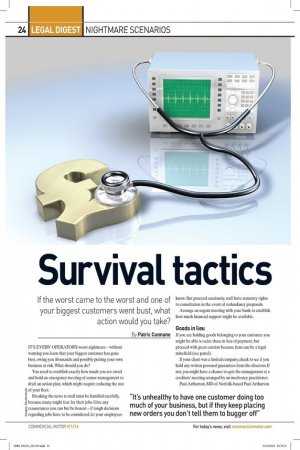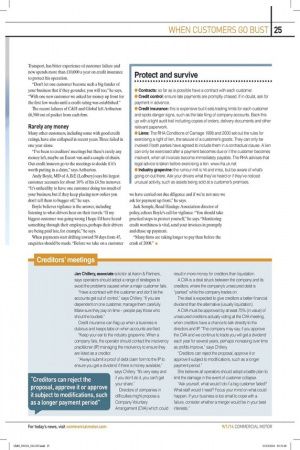Survival tactics
Page 18

Page 19

If you've noticed an error in this article please click here to report it so we can fix it.
If the worst came to the worst and one of your biggest customers went bust, what
action would you take? By Patric Cunnane
IT'S EVERY OPERATORS worst nightmare — without warning you learn that your biggest customer has gone bust, owing you thousands and possibly putting your own business at risk. What should you do?
You need to establish exactly how much you are owed and hold an emergency meeting of senior management to draft an action plan, which might require reducing the size I of your fleet. T= Breaking the news to staff must be handled carefully, because many might fear for their jobs. Give any reassurances you can but be honest — if tough decisions regarding jobs have to be considered, let your employees
know. But proceed cautiously, staff have statutory rights to consultation in the event of redundancy proposals. Arrange an urgent meeting with your bank to establish how much financial support might be available.
Goods in lieu
If you are holding goods belonging to your customer you might be able to seize these in lieu of payment, but proceed with great caution because liens can be a legal minefield (see panel).
If your client was a limited company, check to see if you hold any written personal guarantees from the directors. If not, you might have a chance to quiz the management at a creditors' meeting arranged by an insolvency practitioner. Paul Arthurton, MD of Norfolk-based Paul Arthurton
Transport, has bitter experience of customer failure and now spends more than £10,000 a year on credit insurance to protect his operation.
"Don't let one customer become such a big funder of your business that if they go under, you will too," he says, "With one new customer we asked for money up front for the first few weeks until a credit rating was established."
The recent failures of C&H and Global left Arthurton £6,500 out of pocket from each firm.
Rarely any money
Many other customers, including some with good credit ratings, have also collapsed in recent years. Three failed in one year alone.
"I've been to creditors' meetings but there's rarely any money left, maybe an Escort van and a couple of chairs. Our credit insurers go to the meetings to decide if it's worth putting in a claim," says Arthurton.
Andy Boyle, MD of A.B.E (L,edbury) says his largest customer accounts for about 10% of his £4.5m turnover. "It's unhealthy to have one customer doing too much of your business, but if they keep placing new orders you don't tell them to bugger off," he says.
Boyle believes vigilance is the answer, including listening to what drivers hear on their travels. "If my biggest customer was going wrong I hope I'd have heard something through their employees, perhaps their drivers are being paid late, for example," he says. When payments start drifting toward 50 days from 45, enquiries should be made. "Before we take on a customer
we have carried out due diligence and if we're not sure we ask for payment up front," he says.
Jack Semple, Road Haulage Association director of policy, echoes Boyle's call for vigilance. "You should take practical steps to protect yourself," he says. "Monitoring credit worthiness is vital, send your invoices in promptly and chase up payment. "Many firms are taking longer to pay than before the crash of 2008." •
Protect and survive
Contracts: so far as is possible have a contract with each customer.
• Credit control: ensure late payments are promptly chased. If in doubt, ask for payment in advance.
• Credit insurance: this is expensive but it sets trading limits for each customer and spots danger signs, such as the late filing of company accounts. Back this up with a tight audit trail including copies of orders, delivery documents and other relevant paperwork. • Liens: The RHA Conditions of Carriage 1998 and 2000 set out the rules for exercising a right of lien, the seizure of a customer's goods. They can only be invoked if both parties have agreed to include them in a contractual clause. A lien can only be exercised after a payment becomes due or if the customer becomes insolvent, when all invoices become immediately payable. The RHA advises that legal advice is taken before exercising a lien. www.rha.uk.net
• Industry grapevine: the rumour mill is hit and miss, but be aware of what's going on out there. Ask your drivers what they've heard or if they've noticed unusual activity, such as assets being sold at a customer's premises.
Jan Chillery, associate solicitor at Aaron & Partners, says operators should adopt a range of strategies to avoid the problems caused when a major customer fails.
"Have a contract with the customer and don't let the accounts get out of control," says Chillery. "If you are dependent on one customer, manage them carefully. Make sure they pay on time — people pay those who shout the loudest."
Credit insurance can flag up when a business is dubious and keeps tabs on when accounts are filed.
"Keep your ear to the industry grapevine. When a company fails, the operator should contact the insolvency practitioner (IP) managing the insolvency to ensure they are listed as a creditor. "Always submit a proof of debt claim form to the IP to ensure you get a dividend if there is money available,"
says Chillery. "It's very easy and if you don't do it, you can't get your share." Directors of companies in difficulties might propose a Company Voluntary Arrangement (CVA) which could
result in more money for creditors than liquidation.
A CVA is a deal struck between the company and its creditors, where the company's unsecured debt is "parked" while the company trades on.
The deal is expected to give creditors a better financial dividend than the alternative (usually liquidation).
A CVA must be approved by at least 75% (in value) of unsecured creditors actually voting at the CVA meeting, when creditors have a chance to talk directly to the directors and IP. "The company may say, if you approve the CVA and we continue to trade you will get a dividend each year for several years, perhaps increasing over time as profits improve," says Chillery.
"Creditors can reject the proposal, approve it or approve it subject to modifications, such as a longer payment period."
She believes all operators should adopt a battle plan to limit the damage in the event of customer collapse.
"Ask yourself, what would I do if a big customer failed? What staff would I need? Focus your mind on what could happen. If your business is too small to cope with a failure, consider whether a merger would be in your best interests."






































